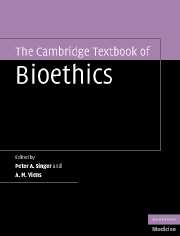Book contents
- Frontmatter
- Contents
- List of contributors
- Acknowledgements
- 1 Introduction
- Section I Information problems
- Section II End of life care
- Section III Pregnant women and children
- Section IV Genetics and biotechnology
- Section V Research ethics
- Section VI Health systems and institutions
- Section VII Using clinical ethics to make an impact in healthcare
- Section VIII Global health ethics
- Section IX Religious and cultural perspectives in bioethics
- Introduction
- 47 Aboriginal bioethics
- 48 Buddhist bioethics
- 49 Chinese bioethics
- 50 Hindu and Sikh bioethics
- 51 Islamic bioethics
- 52 Jehovah's Witness bioethics
- 53 Jewish bioethics
- 54 Protestant bioethics
- 55 Roman Catholic bioethics
- Section X Specialty bioethics
- Index
- References
53 - Jewish bioethics
Published online by Cambridge University Press: 30 October 2009
- Frontmatter
- Contents
- List of contributors
- Acknowledgements
- 1 Introduction
- Section I Information problems
- Section II End of life care
- Section III Pregnant women and children
- Section IV Genetics and biotechnology
- Section V Research ethics
- Section VI Health systems and institutions
- Section VII Using clinical ethics to make an impact in healthcare
- Section VIII Global health ethics
- Section IX Religious and cultural perspectives in bioethics
- Introduction
- 47 Aboriginal bioethics
- 48 Buddhist bioethics
- 49 Chinese bioethics
- 50 Hindu and Sikh bioethics
- 51 Islamic bioethics
- 52 Jehovah's Witness bioethics
- 53 Jewish bioethics
- 54 Protestant bioethics
- 55 Roman Catholic bioethics
- Section X Specialty bioethics
- Index
- References
Summary
Mrs. G is an 85-year-old resident of a Jewish long-term care facility who has vascular dementia, controlled heart failure, and diabetes mellitus. She is bed bound and occasionally recognizes her daughter with a slight smile. The gastrostomy feeding tube she received two years ago has begun leaking and needs to be replaced. Her daughter, who has become her surrogate since the recent death of Mrs. G's husband, has indicated that if the tube were to come out, she would not consent to the insertion of a new tube: a decision she feels would be in accord with her mother's wishes. She would not, however, request that the tube be deliberately removed. The staff are concerned that, by not replacing the tube, they would be failing to maintain the current level of treatment, and she would starve. They feel that this would amount to taking the mother's life, without any substantial decline in her clinical condition. The daughter acknowledges the concern and devotion of the staff and her mother's unchanged clinical status, but reiterates her belief that her mother would prefer to be allowed to die rather than be force fed through a gastrostomy tube.
What is Jewish bioethics?
Judaism
Judaism is the religion of the Jewish People. Judaism is a 3500-year-old tradition based on foundational stories in the Pentateuch – the five books that make up the Torah.
- Type
- Chapter
- Information
- The Cambridge Textbook of Bioethics , pp. 424 - 429Publisher: Cambridge University PressPrint publication year: 2008
References
- 1
- Cited by

